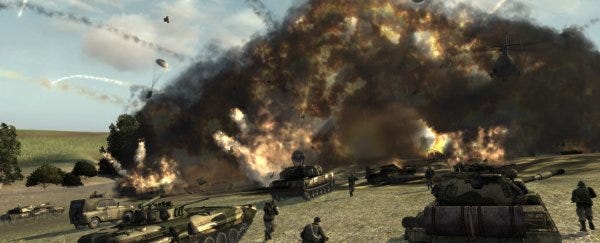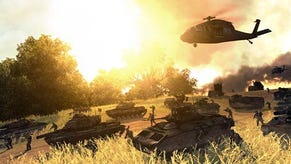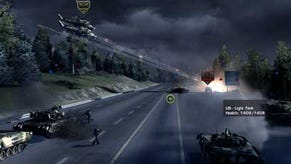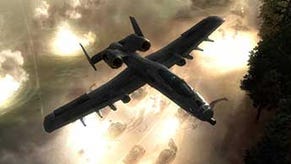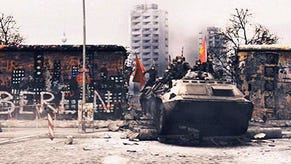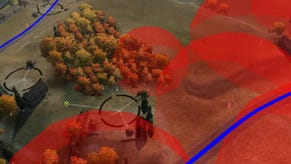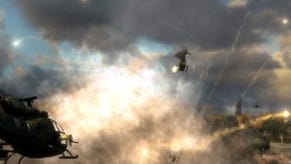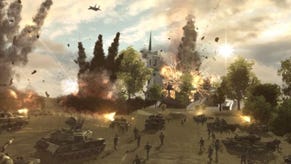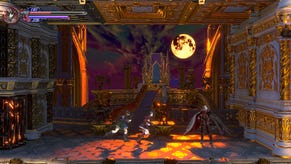Massive On Ground Control and World In Conflict
A couple of weeks ago I had a chance to talk to Massive Entertainment founder Martin Walfisz. He's one of the key minds behind Ground Control and World In Conflict, and arguably one of the biggest influences on the modern RTS game. In this interview we discussed how the company was founded, the fate of Ground Control, how his company forged its future direction with the alternate-history World War III of World In Conflict, and how that game was inspired by FPS games such as Call Of Duty. Also present was VP David Polfeldt, who joined Massive in 1995, but in the end he didn't say anything.
Ground Control, as I've discussed elsewhere, was one of the most important games to me as a gamer. The impression I got from this interview was that the minimalist design found in that game was still the most important example of what Walfisz wanted to create, even with the blockbusting World In Conflict under his belt. Would the team return to the series? It'd be a tough call...
RPS: Hello chaps, thanks for talking to me today. Can we start by just start with you telling me a little about your role at Massive?
Walfisz: I'm the president and founder of the company. I founded Massive in 1997 with a business associate. Myself and David, who is our VP and director of marketing, we run the show.
RPS: You started off your career in game development with what has become an RTS classic, Ground Control. Can you tell us a bit about how that came about?
Walfisz: It was first called Genesis. That was the working title. Originally I started the company with Christian Pérez, who I met when I finished my software engineering studies in 1996. I had been an avid gamer since the Commodore 64, and I was really into Warcraft II and Command & Conquer at the time. There was one vision of Ground Control at that time, which was to make all the classic strategy game features work in a 3D environment. Instead of seeing things topside I wanted to be able to move the camera down and see the actions of the soldiers. It was a visual vision of how to move forward in the strategy genre. Then other part of this was to make it more action-oriented, which all of our games have been. That's how it started in my mind.
RPS: Ground Control didn't do that well in terms of sales did it?
Walfisz: No, it didn't do as well as we'd hoped. When Ground Control was released in 2000 we were still independent... we got so many fantastic reviews and we felt like kings of the world. But then the harsh financial reality hit us: it hadn't made the kind of money we needed to sustain the company long term. We had a couple of troublesome years. We took the idea of doing Ground Control 2 to a number of publishers, but looking at the figures for the first game they all felt it was something of a borderline project. The first game hadn't sold enough to make a sequel an essential game for them. Then in 2002 we were acquired by Vivendi games, who via Sierra, had published the first one. It became clear in the discussions surrounding this acquisition that everyone had a lot of love for Ground Control and we wanted to give it another go.
RPS: How do you feel about the games progressed from Ground Control to Ground Control 2?
Walfisz: Well, when we did Ground Control One, no one at the company had ever done a game before. It was my first game. In fact many people had never even had a job before, so it was just a group of very enthusiastic guys doing their first game. We didn't take into account too much what gamers care about. With Ground Control 2 we started to look at the sales of the first game and say “we have a core that works well, but we want to marry it with more traditional features from RTS games”. Ground Control 2 was taking what we loved about GC1 and combining it with the traditional RTS. We're very proud of Ground Control 2, but I still feel that Ground Control 1 was the better of the two games.
RPS: Did you think that gamers didn't understand the first Ground Control?
Walfisz: Yeah, the strategy market in 2000 was quite different in 2000, compared to how it is today. We were, in that sense at least, ahead of our time. We focused more on action, and less on strategic, long-term aspects of RTS games.
RPS: But you stuck with the core ideas for World In Conflict, and you still tell a linear story. Do you think RTS games are a good way to tell stories? Are they getting better at it?
Walfisz: Well initially there was some discussion about how far we should go with a single player game for World In Conflict, but eventually there was a decision made that we should go all-in, and push how single-player games told stories through strategy. We took things forward. I mean, we're a little biased, but we've done it better than most. Not for me to say! It's for our fans to judge, but people seemed to like the single player.
RPS: So World In Conflict's multiplayer came first?
Walfisz: Yes, it started out as a pure multiplayer project. We looked at what we had done in the original Ground Control multiplayer, and we considered what we had done with the fixed credit pool system. You always have a set number of credits, either in your pool or on the battlefield, and this is a way of mimicking the respawn systems that you get in first person shooters. This means we can allow players to jump in and join at any time, as you can in shooters. This was the initial vision for the game. Single player, as I said, went back and forth. Originally we wanted to focus on this multiplayer vision and not put a lot of effort into it, but then as we discussed things here and with Vivendi, we had some ideas. We increased the ambition of the project to create a really good single player. Again, the inspiration came from shooters, especially the Call Of Duty series. Linear, a little more scripted, but also allowing the player to experience a strong story. In World In Conflict we wanted to bring that kind of feeling in: you're not the main general managing all the units on the battlefield, you're just one guy, commanding a few units. Having these different characters on the battlefield made it obvious that we could tell the story with cinematics and in-game events.
RPS: World War 3 is a bit different to high science fiction. How did you come to that?
Walfisz: It was about finding balanced sides for a strategy game. Your factions have to have, not similar, but /equal/ strengths and weaknesses, if that makes sense. We looked at World War II, with Allies versus Axis being fairly similar, but there were so many games there already. We had already created a sci-fi universe with Ground Control, and we didn't want to go into a fantasy universe. We wanted to do something contemporary, something that people could look at and understand immediately. Pretty soon we came up with that “what if” to create a showdown between the US and USSR. Two superpowers of seemingly equal strength seemed like the perfect setting for the game.
RPS: How has World In Conflict's multiplayer been received by players?
Walfisz: Looking at things like the Gamespy statistics I can say that World In Conflict is the most played RTS aside from the ones we really have no stats for, namely the Blizzard games, Starcraft and Warcraft. Aside from them, we're the big ones.
RPS: How much as the game changed while “live”?
Walfisz: Well the game was solid even before beta, and when we hit beta we were already confident that the core game was strong. What we've added since then has been small things – polish, small new features. We've done balance changes that the community wanted and added a couple of maps. We're pretty happy with it.
RPS: Did the beta sell the game?
Walfisz: Yes, oh yes. The beta test does have the purpose of testing and balancing, but the other purpose is simply to get people to play the game. Hopefully if they do this they'll like it.
RPS: And clans and so on were already being formed in the beta.
Walfisz: Absolutely, we have full support for clans in MassGate, and I think there are now thousands of clans using that system. We're also seeing evidence of interest in e-sports.
RPS: You've got e-sports tournaments going on now?
Walfisz: I believe so. It should be no surprise, I think. World In Conflict is perfect for e-sports because of the way it works.
RPS: So what lies ahead for you guys? Where now for Massive?
Walfisz: Well there's the 360 version of World In Conflict to take care of, but we have a lot of love for the game. You can expect to see us return to that on the PC.
RPS: And Ground Control? Dead and buried?
Walfisz: Well, hmm, it's an interesting question. We think about it on and off, but in reality it didn't pick up and get the fanbase we needed. Relaunching Ground Control would now be similar to launching a new IP... I might exaggerate a little. It does have fans. But we have no immediate plans.
RPS: Were people resistant to science fiction? Is the modern-world of WiC just more comprehensible?
Walfisz: Yes, at least in the sense that to create a fantasy or science fiction universe means to explain what the laws of that universe are, and get people to understand them. If the setting is “real world” people connect right away – they know what to expect. Sci-fi and fantasy is a little harder to create for. The Ground Control universe is really rich, and we know so much about it, but we didn't really manage to convey that. If we did a game in the future we'd make more effort to convey the universe a little better.
RPS: And presumably you're better and story-telling after the narrative-heavy campaign in World In Conflict?
Walfisz: Absolutely, it was something we wanted to explore as a studio: how to get better at telling stories. That was a big motivation to do the single player campaign. How /do/ you get a player interested? I would say we weren't very good at telling stories before this. We were okay, but we have learned so much in developing World In Conflict.
RPS: What problems did you have to overcome to get better at story-telling?
Walfisz: Well we have a brilliant writer. Realising he was as good as he was... it was very satisfying. For me the biggest challenge was to not worry about whether we were doing this in the right way. I was constantly worrying that the story was not being told in the right way. But I can say now that I didn't have to worry.
RPS: Are you still excited about real-time strategy? Does it have a future?
Walfisz: Well we're moving more into action strategy, and I think that's the right direction. Because of the console development of RTS games they will become more action and less about building.
RPS: Is it true that Massive are developing an fantasy RPG?
Walfisz: Ha, well I don't know what rumours you heard. We are looking at other options.
RPS: I look forward to seeing what you come up with. Thanks for talking to me.
Walfisz: Okay, thanks Jim.
